| Srl | Item |
| 1 |
ID:
155736


|
|
|
|
|
| Summary/Abstract |
The incongruity between traditional research standards and the realities of “big data” raises novel ethical questions for political science researchers. Data’s status as a commodity largely held by private companies only further confuses matters. Drawing on Max Weber, this article attempts to shift the current ethical discussion away from the individualistic concern for privacy toward the more collective framework of democratic values.
|
|
|
|
|
|
|
|
|
|
|
|
|
|
|
|
| 2 |
ID:
192303
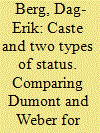

|
|
|
|
|
| Summary/Abstract |
In this article I argue that the concept of status requires more attention in today’s scholarly approach to caste. Caste has become a contested concept which authors define in multiple ways, but the different definitions of status in India’s caste system remain unclear. This article focusses on the two seminal contributions of Louis Dumont and Max Weber. Both have frequently been criticised and dismissed, but this article aims to delineate and compare their different understandings of status. Their contributions have often been judged according to their cultural significance or general concepts of modernity; however, by unpacking their approaches to status, a proper distinction can be made between achieved and attributed status in the study of caste. Thus, revisiting and comparing Dumont’s and Weber’s different concepts of status may create greater clarity when explaining ‘exclusion’ and the evolving caste practices in India and in the diaspora.
|
|
|
|
|
|
|
|
|
|
|
|
|
|
|
|
| 3 |
ID:
104190


|
|
|
|
|
| Publication |
2010.
|
| Summary/Abstract |
This article uses Max Weber's analysis of charisma to differentiate types of symbolic places. Although Weber did not include the role of space in his analysis of charisma, we can construct different types of spatial charisma based on his distinction between traditional and bureaucratic regimes. Heritage sites and monuments are used by traditional regimes to legitimise their rule by looking back to their charismatic origins, while futuristic places are used to convince the population that bureaucratic regimes will provide a brighter future. In reality these ideal types of charismatic places are almost always mixed. Nation-states combine both types of charismatic places. The analysis of the Zeche Zollverein in Essen, Germany shows that the meaning of a place can change and incorporate both types of spatial charisma at the same time and place. This was the consequence of a deliberate policy to legitimise a new economic regime in Germany's Ruhr area.
|
|
|
|
|
|
|
|
|
|
|
|
|
|
|
|
| 4 |
ID:
164836
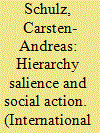

|
|
|
|
|
| Summary/Abstract |
Hierarchy is a persistent feature of international politics. Existing accounts recognize that there are many ways in which actors can stand in relation to one another. Yet they struggle to make sense of this complexity. This study considers Max Weber’s contribution to understanding international hierarchy. It discusses three ideal types of stratification based on the distribution of capabilities (class), estimations of honor and prestige (status), and command relationships (authority). Following the neo-Weberian approach, these dimensions matter because they make social action intelligible. Furthermore, Weber clarifies how class and status are connected and how these two dimensions relate to authority through the process of ‘social closure’. The study concludes that scholars who focus exclusively on authority structures miss the fact that authority typically derives from other forms of stratification: although based on different logics of social stratification, class and status hierarchies often coalesce into (legitimate) authority.
|
|
|
|
|
|
|
|
|
|
|
|
|
|
|
|
| 5 |
ID:
153890


|
|
|
| 6 |
ID:
030611
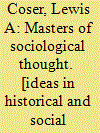

|
|
|
|
|
| Publication |
New York, Harcourt Brace Jovanovich, 1971.
|
| Description |
xxi, 485p.Hbk
|
| Standard Number |
0155551280
|
|
|
|
|
|
|
|
|
|
|
|
Copies: C:1/I:0,R:0,Q:0
Circulation
| Accession# | Call# | Current Location | Status | Policy | Location |
| 007345 | 923/COS 007345 | Main | On Shelf | General | |
|
|
|
|
| 7 |
ID:
153902
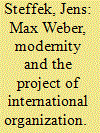

|
|
|
|
|
| Summary/Abstract |
In this essay I discuss programmatic proposals for international organization in the light of Max Weber's account of modernity. I argue that the authors known in international relations (IR) as ‘functionalists’ have pursued the extension of the modernization process that Weber analysed in national societies into the international sphere. Between 1900 and 1945, functionalists advocated a transformation of international politics, at that time still the domain of a lot of jingoism and aggression, into rational public administration. In the first part of the article I outline Weber's account of societal modernization with a focus on the sharp contrast between politics and bureaucratic administration. In the second section I engage with the writings of three political scientists who represent the early ‘functionalist’ tradition in IR: Paul Reinsch, James Arthur Salter and David Mitrany. I show how they planned to modernize IR by establishing a technocratic mode of governance and hence a Versachlichung der Gewaltherrschaft, that is, a depersonalization and rationalization of authority. The turn to international organizations in the early twentieth century thus can be seen in the context of the universal process of societal modernization as rationalization that Weber analysed.
|
|
|
|
|
|
|
|
|
|
|
|
|
|
|
|
| 8 |
ID:
075323


|
|
|
|
|
| Publication |
2006.
|
| Summary/Abstract |
This contribution sketches Max Weber's model of historical causation and contrasts it to Robert Brenner's property relations approach, as appropriated by Teschke. A consideration of theoretical and methodological differences is complemented by a substantive argument concerning the role of religion in state formation. It is suggested that Teschke's focus on the 'logic of exploitation' leads to his marginalizing the role of religion and the importance of the collective action of 'ordinary people'.
|
|
|
|
|
|
|
|
|
|
|
|
|
|
|
|
| 9 |
ID:
131710
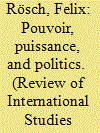

|
|
|
|
|
| Publication |
2014.
|
| Summary/Abstract |
Hans Morgenthau's concept of power is widely debated among scholars of International Relations. Superficial accounts present Morgenthau's concept of power in the Hobbesian tradition as a means of self-preservation; however, more thorough investigations demonstrate Morgenthau's psychogenic and praxeological understanding. By referring to Sigmund Freud and Max Weber, such accounts identify Morgenthauian power as the ability to dominate others. This article contributes to this discourse by demonstrating that Morgenthau separated power into two dualistic conceptualisations. Although analytically Morgenthau worked with a concept of power understood as domination, normatively - in reference to Friedrich Nietzsche and Hannah Arendt - he promoted a concept of power that focused on the will and ability to act together. Elaborating this dualistic concept has wider implications for current International Relations because it reminds scholars to be self-reflexive. In addition, it is argued that a Morgenthauian scholarship helps scholars to gain a more profound understanding of depoliticising tendencies in Western democracies.
|
|
|
|
|
|
|
|
|
|
|
|
|
|
|
|
| 10 |
ID:
154042
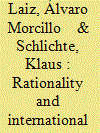

|
|
|
|
|
| Summary/Abstract |
Rationalization, a core concept of Max Weber’s sociology, has so far largely been ignored in International Relations (IR) theory discussions, although his ideas about rationalization open new pathways for theorizing modernity and conflict. We revisit Weber’s concepts of rationalization and domination to show the limits of two key bodies of related knowledge in IR: scholarship on international organizations as bureaucracies and ideas on rationalization in the world polity approach. Rereading Weber’s approach to rationalization provides a distinct ground for our understanding of the current internationalization of rule. We illustrate the contribution our approach to rationalization makes by looking at budget support to sub-Saharan African states, and Mozambique in particular. The article concludes with a discussion of the implications that a critical rereading of Max Weber has for international politics.
|
|
|
|
|
|
|
|
|
|
|
|
|
|
|
|
| 11 |
ID:
153894
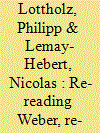

|
|
|
|
|
| Summary/Abstract |
This article analyzes how different interpretations of Max Weber’s work on the state and legitimacy have materialized in contemporary research on—and practice of—international state-building. We argue that the currently prevailing neo-Weberian institutionalism in state-building theory and practice is based on a selective interpretation of the passionate and polemicist ‘politician’ Max Weber, whilst omitting almost entirely the wealth of thought on interpretivist method and the anti-foundationalist approach to social sciences that he has developed in his scholarly work. The neo-Weberian institutionalist approach thus focuses almost exclusively on state capacity and institutions. In contrast to this restricted approach, we will show how Weber’s work on the historical and cultural dimensions of legitimacy is instructive in understanding the emergence and consolidation of social orders. Research agendas embracing such perspectives offer a viable way forward from the securitized approach to state-building and international intervention, in the process moving beyond the neo-Weberian orthodoxy.
|
|
|
|
|
|
|
|
|
|
|
|
|
|
|
|
| 12 |
ID:
129832
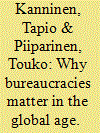

|
|
|
|
|
| Publication |
2014.
|
| Summary/Abstract |
This article will challenge the conventional wisdom according to which international bureaucracies are unviable and undesirable in the age of globalisation. The relevance and powers of today's international bureaucracies can best be understood by reference to the model of the 'network logic of globalisation' rather than Max Weber's classic theory alone. Bureaucracies are undergoing a transformation from the rigid and hierarchical institutions of Weber's time to more network-oriented and delayered post-Weberian entities. On occasion, these post-Weberian structures allow middle-level officials in international organisations to wield considerable new bureaucratic powers. The case study of this article draws upon empirical evidence on the drafting and implementation of An Agenda for Peace (1992) by UN Secretariat officials and its contributions to the United Nations early warning and conflict prevention mechanism. The network-oriented structures and approaches have started to permeate the UN Organisation in two ways: First, the United Nations operates more and more through interdepartmental and interagency teams. This trend was evident already in the drafting and implementation processes of the Agenda. Second, the United Nations is reaching out to academic and civil society networks. The start of these two transformations of the UN bureaucracy is related to globalisation and can be seen already in action in the early 1990s when the Agenda was drafted.
|
|
|
|
|
|
|
|
|
|
|
|
|
|
|
|